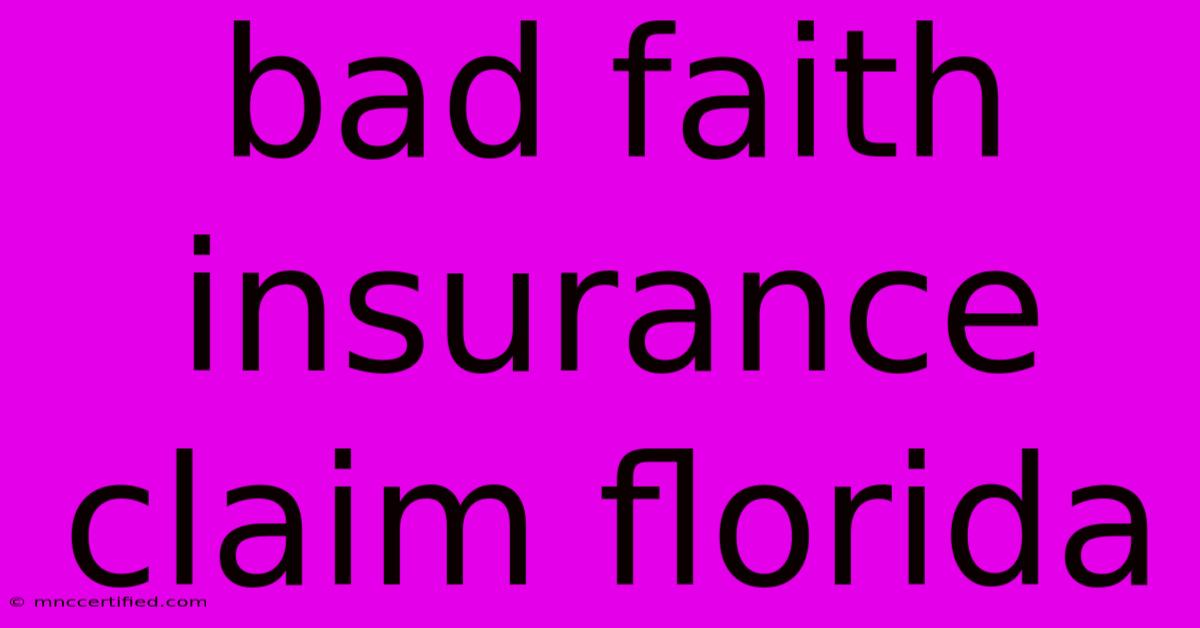Bad Faith Insurance Claim Florida

Table of Contents
Navigating the Murky Waters: Bad Faith Insurance Claims in Florida
Filing an insurance claim after a significant event like a house fire or car accident should be a straightforward process. Unfortunately, in Florida, as in many states, dealing with insurance companies can sometimes feel like navigating a minefield. This article delves into the complexities of bad faith insurance claims in Florida, outlining what constitutes bad faith, how to identify it, and the steps you should take to protect your rights.
Understanding Bad Faith in Florida Insurance Claims
In Florida, bad faith refers to an insurance company's unreasonable and unfair denial or delay of a legitimate insurance claim. It's a breach of the implied covenant of good faith and fair dealing that exists in every insurance contract. This isn't about simple disagreements over claim value; it's about the insurer's conduct throughout the claims process.
Key indicators of bad faith insurance practices in Florida include:
- Unreasonable delays in investigating and processing claims: Prolonged delays without a justifiable reason can signal bad faith. This includes failing to contact you promptly, neglecting to gather necessary evidence, or dragging out the claims adjustment process unnecessarily.
- Denial of a valid claim: If your claim is clearly covered under your policy, and the insurer denies it without sufficient evidence or justification, this is a strong indicator of bad faith.
- Unfair settlement offers: Lowball offers that significantly undervalue your damages, especially after you've provided substantial documentation, can point to bad faith.
- Failure to properly investigate a claim: An insurance company has a duty to thoroughly investigate your claim. If they fail to do so, leading to an incorrect denial or a low settlement offer, it could be considered bad faith.
- Failure to communicate effectively: Ignoring your calls, emails, or letters, or providing inconsistent or misleading information, are all signs of potential bad faith.
- Engaging in deceptive practices: This includes misrepresenting policy terms, making false promises, or employing other deceptive tactics to avoid paying a legitimate claim.
What constitutes a "legitimate" claim?
A legitimate claim is one that is supported by sufficient evidence and falls within the coverage provided by your insurance policy. This usually includes documentation like police reports, medical records, repair estimates, and photographs. If you have a strong case, and the insurance company is still acting in bad faith, you have grounds for legal action.
Proving Bad Faith in Florida: Gathering Evidence
Proving bad faith requires meticulous documentation. Keep records of everything:
- All communication: Save emails, letters, phone call notes, and any other form of communication with the insurance company.
- Policy documents: Maintain a copy of your insurance policy and any relevant endorsements.
- Claim documentation: Keep all documents related to your claim, including the initial claim form, supporting evidence, and any correspondence with adjusters.
- Medical records: If your claim involves injuries, gather complete medical records, including doctor's notes, test results, and treatment plans.
- Repair estimates: If property damage is involved, obtain multiple repair estimates to support your claim for damages.
- Witness statements: If applicable, get written statements from anyone who witnessed the event that led to your claim.
Pursuing Legal Action for Bad Faith in Florida
If you believe your insurance company has acted in bad faith, you should consult with a Florida bad faith insurance attorney. They can advise you on the strength of your case and the best course of action. A lawsuit for bad faith can lead to significant financial recovery, including:
- Damages for the actual loss: This is the amount you should have received under your policy.
- Punitive damages: These are awarded to punish the insurance company for their egregious conduct and may significantly exceed the actual loss.
- Attorney’s fees and costs: The court may order the insurance company to pay your legal fees and expenses.
Finding a reputable attorney is crucial. Look for lawyers specializing in insurance bad faith cases in Florida. Check online reviews and testimonials before making a decision.
Preventing Bad Faith: Proactive Steps
While you can't always prevent bad faith, you can minimize the risk by taking proactive steps:
- Thoroughly review your policy: Understand your coverage and what constitutes a valid claim.
- Document everything meticulously: Maintain detailed records from the moment you experience a loss.
- Communicate clearly and professionally: Maintain a record of all communications with your insurance company.
- Follow all instructions: Promptly respond to requests for information from your insurer.
Dealing with insurance companies can be challenging, but understanding your rights and taking proactive steps can significantly improve your chances of a fair and timely resolution. If you suspect bad faith, seeking legal counsel is essential to protect your interests. Don't hesitate to seek professional help – it could make a substantial difference in the outcome of your case.

Thank you for visiting our website wich cover about Bad Faith Insurance Claim Florida. We hope the information provided has been useful to you. Feel free to contact us if you have any questions or need further assistance. See you next time and dont miss to bookmark.
Featured Posts
-
First Eagle Municipal Bond Fund
Nov 23, 2024
-
Peter Kay Residency Ticket Buying Guide
Nov 23, 2024
-
Senior Insurance Woodland Hills
Nov 23, 2024
-
Rivals Of Aether Tier List 2024
Nov 23, 2024
-
San Francisco County Flood Advisory
Nov 23, 2024